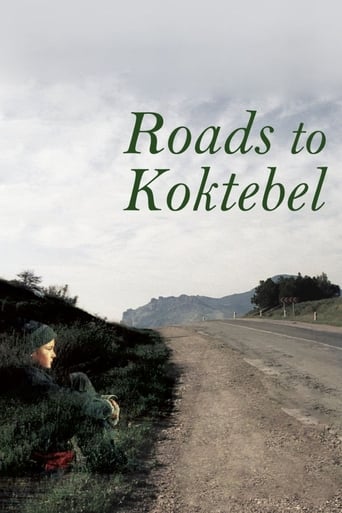Ron Chow
I stumbled upon the DVD version of this film and, being a moderate fan of Russian cinema, made the time investment to watch it.The film was slow, and some takes were, in my opinion, unnecessarily long. The hand-held, back-and-forth capture of the boy throwing stones at a heap of junk strained my eyes, and I found it annoying and unnecessary.However, the film also has the typical merits of a low-budget, personal film which does have a story to tell. The acting was fine, the story simple and yet believable, and the shots were visually pleasing.This is by no means a great film, but I will recommend it to anyone who is fond of Russian cinema, and has the patience and a desire to have glimpses of modern Russia.
Andres Salama
A pleasant enough road movie, about a divorced (or widowed, I don't remember) man going with his young son from Moscow to the Crimea. He's an aeronautical engineer who has been fired and has hit the bad times (maybe with the recovery of Russia's economy under Putin, the argument is slightly out of date). We see them traveling through the countryside in a dilapidated train, and then through the bad roads of Western Russia and Eastern Ukraine. Nothing much happens, but before reaching the Black Sea they stop at small towns, where they offer to repair the roof to a house where a mean old man lives, meet a pretty young doctor, etc. Some reviews I read wrote about the pair traveling through the desolate steppes of the former Soviet Union, yet this is some of the most fertile and densely populated part of that country. The pace of the film is slow, though not terribly so, compared with traditional Russian cinema, and the characters seem real even if the plot is slightly far-fetched. Recommended.
gospodinBezkrai
One should be in a relaxed mood when going to see this film. Be there to tranquilly cherish the moments of life and the film will open itself and offer you all its hidden prizes.Someone mentioned the landscapes are bleak... The film is isomorphic to its landscapes. Bleak and lovely at the same time. Little bit depressing for those who choose to stay at a distance, to look at (film or landscapes) as at exhibits. For those who step in, it becomes precious in its touching ugliness. As you enter, ugliness is redefined. We are able to adore and love what we thought ugly before when we lived in the world bombarded by artificially selected beauty. We appreciate the naturality, the simple yet awkward reality of landscapes, of characters and of situations. The directing and actors are both excellent and succeed to achieve this reality so difficult to balance on screen!There isn't more talk than necessary, more expression of emotions or velocity of thought than a real living person would allow - not any of the tricks directors have to use to keep us interested. Yet the film is not boring. Because we can feel and understand the characters on screen as fully as we can a human being next to us! We can recognize little parts from the happening in the memories of our own life. Memories otherwise we'd never pay attention to.
Sheila Cornelius
I have just seen this film at the Renoir in London, and found much to enjoy. At first the basic story-line of the father looking for a haven and the boy for a world of adventure and freedom, seemed slow-moving but the early long takes gave the viewer time to absorb the landscape and the point-of-view, in particular the boy's slow awakening to the reality of his situation. His ability to 'see everything from above', demonstrated to the forest-dwelling girl early in the film when he drew a map of a terrain unknown to him, was an early signal of his superior grasp of reality and an introduction to the main metaphorical cluster of the film. The use of birds, glider and flying-paper imagery rang the changes on the visual representation of the boy's yearnings; a galaxy of Dostoyevsian larger-than-life and twice-as-unpredictable Russian characters met along the way added intrigue and ethnic authenticity to the story-line. The bizarre minor characters contrasted with the down-to-earth ordinariness of the tensions between the father and son. Their habitats were astonishing and yet completely acceptable within the heightened realism established in the early scenes - the railworker's shed with the lavatory doubling as a vodka store - the tumble-down mansion whose roof the father stayed to repair with disastrous consequences, the hillside ox-roast with flying sparks visible for miles and a suddenly-looming lorry-driver big as Brian Blessed hefting the boy across his shoulders with a triumphant cry of 'Meat! and a chill echo of 'Texas Chain Saw '.The Amazonian, silent 'Xenia', for all her 'sweatiness' complained of by the boy, was given a similarly apocryphal persona. All were separated by muddy fields and clawing shrubland which the camera allowed us to experience as visually alienating at a distance and unbearably uncomfortable up close. Questions raised were as much about Russian geography and history as about the central relationship and its outcome. By the end, the mention of 'Koktebel', whose very absence from the atlas referred to a historical shift in identity, carried the resonance of Chekhov's 'Moscow', in his masterpiece about longing and nostalgia, 'Three Sisters'. At the end of the film, when the uncertain pleasures of routine existence versus an ungraspable freedom had been clearly delineated, the binding ties of father and son remained as unresolved and problematic as at the beginning. Like the evenly-matched wrestlers in the hillside firelight, they were forced to declare an uneasy truce.

